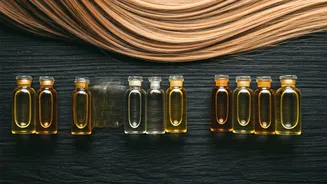Argan Oil's Magic
Argan oil, often celebrated as 'liquid gold,' is a versatile elixir sourced from the kernels of the argan tree. It's packed with essential fatty acids,
antioxidants, and vitamin E, all of which play a vital role in hair health. Its lightweight texture allows for easy absorption, making it a favorite for all hair types. Argan oil is particularly effective at hydrating the scalp, reducing dryness, and promoting the elasticity of hair strands. By regularly applying argan oil, you can repair split ends, minimize frizz, and boost shine, leading to hair that looks and feels remarkably healthier. Furthermore, this oil shields the hair from environmental stressors like UV rays and pollution. Incorporating argan oil into your hair care routine can be as simple as adding a few drops to your shampoo or conditioner, or using it as a pre-styling treatment to detangle and protect your hair.
Coconut Oil Power
Coconut oil is a staple in many households, celebrated for its moisturizing and strengthening properties. It is rich in lauric acid, which has a high affinity for hair proteins, enabling it to penetrate the hair shaft deeply. This deep penetration helps to reduce protein loss, which is essential for preventing hair breakage and damage. Coconut oil is particularly effective for those with dry or damaged hair, as it replenishes moisture and improves elasticity. Regular use of coconut oil can result in softer, smoother hair, reduced frizz, and a healthier scalp. The application can range from using it as a pre-shampoo treatment, a conditioner, or even a leave-in treatment for added shine and protection. Remember that coconut oil tends to solidify at cooler temperatures, so it is often best to warm it slightly before use to ensure even application.
Jojoba Oil's Excellence
Jojoba oil is a unique oil that closely resembles the sebum naturally produced by the human scalp. This similarity allows it to effectively regulate oil production, making it suitable for all hair types, including those with oily scalps. Jojoba oil is lightweight and non-greasy, which means it won't weigh your hair down. The oil acts as a powerful moisturizer and helps to unclog hair follicles, which can promote hair growth. It also helps in maintaining scalp health by preventing dandruff and dryness. Jojoba oil is rich in vitamins and minerals like vitamin E, B complex, zinc, and copper, all of which are essential for hair health and growth. When using jojoba oil, you can apply it directly to your scalp and hair, leave it in as a mask, or use it as a styling agent to add shine and control frizz. Its versatility makes it an excellent addition to your hair care regimen.
Castor Oil Benefits
Castor oil is well-regarded for promoting hair growth and thickness. It is derived from the castor bean and is rich in ricinoleic acid, which is believed to enhance blood circulation to the scalp. Improved blood flow can stimulate hair follicles, promoting faster hair growth and reducing hair loss. Castor oil is also a potent moisturizer, helping to hydrate the hair and scalp, reducing dryness and flakiness. The thick, viscous nature of castor oil allows it to coat the hair strands, adding shine and protection against damage. When using castor oil, it's best to mix it with a lighter oil, like coconut or jojoba, to reduce its thickness and facilitate application. Use it as a scalp massage for enhanced blood flow, or apply it to the ends of your hair to seal in moisture and repair split ends. Regular application of castor oil can lead to noticeably thicker and healthier hair over time.
Rosemary Oil's Magic
Rosemary oil is an essential oil known for its stimulating properties, which promote hair growth and scalp health. Its ability to improve circulation in the scalp makes it a powerful ally against hair loss, as it brings more nutrients to the hair follicles. Rosemary oil also possesses anti-inflammatory and antioxidant properties, which help to combat scalp issues like dandruff and itchiness. When using rosemary oil, it is important to dilute it with a carrier oil, such as jojoba or almond oil, to prevent skin irritation. Apply this diluted mixture directly to your scalp, massage gently, and leave it on for a minimum of 30 minutes before washing your hair. Consistent use of rosemary oil can lead to reduced hair loss, increased hair thickness, and a healthier scalp. Remember to perform a patch test before using it extensively to ensure there are no adverse reactions.
Almond Oil's Nourishment
Almond oil is a light, nourishing oil that is packed with vitamins and minerals like vitamin E, magnesium, and omega-3 fatty acids. These nutrients play an essential role in maintaining hair health and stimulating growth. Almond oil helps to strengthen hair strands, reducing breakage and split ends. It also moisturizes the scalp, reducing dryness and dandruff. Its lightweight consistency makes it easy to apply and absorbs quickly into the hair without weighing it down. You can use almond oil as a pre-shampoo treatment, applying it to your hair and scalp for 30 minutes before washing, or use it as a leave-in conditioner to add shine and manageability. Regular application of almond oil can result in softer, smoother, and more resilient hair. It also helps to protect hair from sun damage and environmental stressors, making it an excellent all-around hair care product.
Grapeseed Oil's Lightness
Grapeseed oil is a lightweight oil that is extracted from grape seeds, and is ideal for those with fine or oily hair. It is non-greasy and absorbs quickly, making it a perfect choice for daily use. Grapeseed oil is rich in linoleic acid, an omega-6 fatty acid that promotes hair growth and strengthens hair follicles. It also contains antioxidants that protect hair from environmental damage. Grapeseed oil helps to moisturize the hair without weighing it down, leaving it soft and shiny. You can apply grapeseed oil to damp hair after washing, or use it as a heat protectant before styling. It is an excellent choice for adding shine and reducing frizz. Using grapeseed oil regularly can lead to healthier, more manageable hair without the heavy, oily feeling sometimes associated with other hair oils. Its versatility makes it suitable for all hair types.
Tea Tree Oil's Cleansing
Tea tree oil is a powerful essential oil known for its antiseptic and antifungal properties, making it excellent for scalp health. It can help in combating dandruff, itchiness, and other scalp conditions that can hinder hair growth. Tea tree oil helps to unclog hair follicles, promoting healthy hair growth. However, it's potent and must be diluted with a carrier oil before use to prevent skin irritation. A few drops of tea tree oil mixed with a carrier oil such as jojoba or coconut can be massaged into the scalp, left on for about 30 minutes, and then rinsed off. Its regular use helps in maintaining a clean, healthy scalp environment, crucial for promoting hair growth and reducing hair loss. Tea tree oil is particularly useful for those struggling with scalp issues, and offers a natural, effective solution for improving hair health.
Avocado Oil Benefits
Avocado oil is rich in monounsaturated fats, vitamins, and minerals that deeply moisturize and nourish hair. It is known for its ability to penetrate the hair shaft, providing deep conditioning and reducing breakage. The oil is rich in vitamin E, which acts as an antioxidant, protecting hair from damage. Avocado oil is particularly beneficial for dry, brittle hair, providing intense hydration and improving elasticity. It can be used as a hair mask, left on for 20-30 minutes before washing, or added to conditioners for added moisturizing benefits. Regular use of avocado oil promotes softer, smoother, and more manageable hair, with a noticeable improvement in overall hair health and shine. It's a natural remedy for restoring vitality and strength to damaged hair, making it a valuable addition to your hair care regimen.
Olive Oil's Power
Olive oil, a staple in Mediterranean cuisine, is also a fantastic treatment for hair. It’s rich in monounsaturated fats and antioxidants, and has been used for centuries to nourish and strengthen hair. Olive oil penetrates the hair shaft, providing deep moisture and reducing protein loss, crucial for preventing breakage and split ends. It helps to soften and add shine to hair, making it more manageable. You can apply olive oil as a pre-shampoo treatment, leaving it on your hair for at least 30 minutes before washing, or use it as a leave-in conditioner for extra moisture. Regular use of olive oil can result in healthier, stronger, and more lustrous hair. Its natural properties make it an excellent choice for those seeking a simple yet effective way to improve their hair's condition and appearance.















